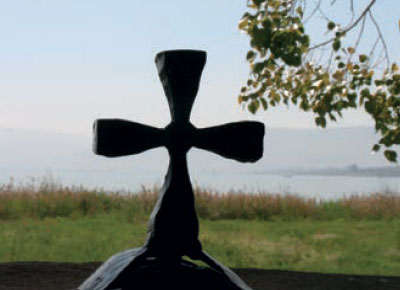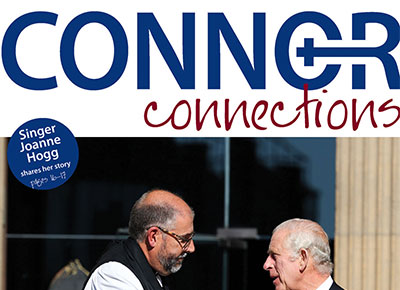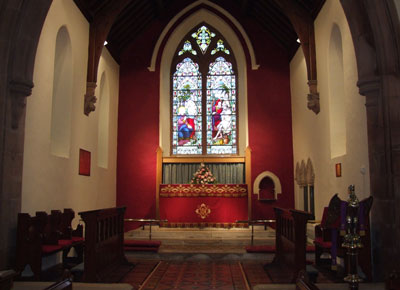Dean preaches at World Police and Fire Games Memorial Service
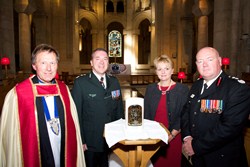 Photos: The Rev Douglas Goddard
Photos: The Rev Douglas Goddard
The Dean of Belfast, the Very Rev John Mann, was the preacher at a special World Police and Fire Games Memorial Service for Fallen Police, Fire and Prison Officers in St Anne’s Cathedral on August 4.
In his sermon, the Dean welcomed the thousands of athletes who have come to Belfast from 67 countries to take part in the prestigious games.
“Personal endeavour in seeking excellence, in achieving the best that is possible for any individual, as part of a team, isgalvanizing for everyone, competitor and armchair critic alike,” Dean Mann told a packed Cathedral at the 6.30pm service.
The Dean’s sermon can be read in full below.
SERMON BY THE DEAN OF BELFAST AT THE WORLD POLICE AND FIRE GAMES MEMORIAL SERVICE
4th August 2013 – Sermon for the World Police and Fire Games Memorial Service
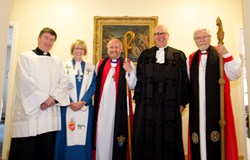 The World Police and Fire Games coming to Northern Ireland is hugely important for us all who live here; in this City or elsewhere in the beautiful north of Ireland. The Games draw sentiments of sport and security together – the competitors are of three of the most important services of any nation: a dedicated police force, a respected prison service and an organisation of fire–fighters ready to risk their lives to save others; and so often it is that sport (particularly team games) can both symbolise national or community identification and rivalry, and also engender huge respect across those very boundaries that such community identification potentially erects. Such a mix of social interaction and the experience of an ordered society based not only on respect (which is but the starting point of mutual co–existence), but also on the ability to share and the eagerness for engagement, that can always be found in the common rivalry of sport.
The World Police and Fire Games coming to Northern Ireland is hugely important for us all who live here; in this City or elsewhere in the beautiful north of Ireland. The Games draw sentiments of sport and security together – the competitors are of three of the most important services of any nation: a dedicated police force, a respected prison service and an organisation of fire–fighters ready to risk their lives to save others; and so often it is that sport (particularly team games) can both symbolise national or community identification and rivalry, and also engender huge respect across those very boundaries that such community identification potentially erects. Such a mix of social interaction and the experience of an ordered society based not only on respect (which is but the starting point of mutual co–existence), but also on the ability to share and the eagerness for engagement, that can always be found in the common rivalry of sport.
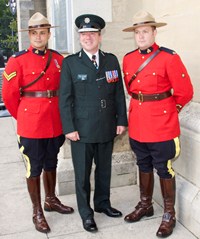 Personal endeavour in seeking excellence, in achieving the best that is possible for any individual, as part of a team, is galvanizing for everyone, competitor and armchair critic alike. This City, that has seen so much division and still periodically consumes itself in fruitless and destructive violent protest and individual sectarian attacks; is, nonetheless, a place of healing. It is not healed, it is a place of healing; it is not that we forget the past or have managed to overcome every frustration, but it is a place that we are training ourselves, year by year and month by month, to remember what has gone in a way that acknowledges the suffering of others as well as our own; it is not that we are in a city that cannot face its problems, actually, life in Belfast is vibrant and forward–looking and has many amazing people who are doing wonderful work, but we are learning that, seeking a shared future, involves being comfortable in our own skin as well as understanding others in theirs, and that it has to work both ways; it involves boldness and risk and sensitivity and a willingness to be criticised by those who are not ready for change, perhaps for very good reasons.
Personal endeavour in seeking excellence, in achieving the best that is possible for any individual, as part of a team, is galvanizing for everyone, competitor and armchair critic alike. This City, that has seen so much division and still periodically consumes itself in fruitless and destructive violent protest and individual sectarian attacks; is, nonetheless, a place of healing. It is not healed, it is a place of healing; it is not that we forget the past or have managed to overcome every frustration, but it is a place that we are training ourselves, year by year and month by month, to remember what has gone in a way that acknowledges the suffering of others as well as our own; it is not that we are in a city that cannot face its problems, actually, life in Belfast is vibrant and forward–looking and has many amazing people who are doing wonderful work, but we are learning that, seeking a shared future, involves being comfortable in our own skin as well as understanding others in theirs, and that it has to work both ways; it involves boldness and risk and sensitivity and a willingness to be criticised by those who are not ready for change, perhaps for very good reasons.
So thank you for bringing these Games to the green hills and sparkling waters and lush playing fields and sometimes even blue skies of our very special corner of Ireland, and for being part of the life of this place for these days, enriching us with your presence and helping us to remember those who have served in their role in a police, fire or prison service somewhere in the world, but have made the ultimate sacrifice for others. Those individuals we recall today, in solemnity and gratitude, as we pray for their families with thanksgiving for their life, because of what they have endured and continue to suffer. Those who have not suffered cannot begin to understand what courage it takes to forgive, what tears of grief continue to come from wounds too deep for words.
Jesus, in the reading from the Gospels in this service is about to step, himself, into considerable danger and he chooses to go with the inner circle of his disciples to the top of a mountain. There they all encounter a very special presence. Today, if one were ascending the Mount of the Transfiguration of Jesus one would probably do it in a taxi – there is a road almost to the top now, but it is narrow and full of hairpin bends. Of course this is not quite what we imagine when we read the story from the Gospels and hear of the remarkable sight of our Lord being changed in appearance before his closest disciples on the mountaintop. We may well ask the question – what is this all about? Does it have any relevance to the World Police and Fire Games and to this Memorial Service? It was not until about 1,000 years ago that the Festival of the Transfiguration was established by the Church on 6th August two days from now, but long before that, the mountain top became one of the places of great importance in religious life, not least in the Judeo–Christian tradition. Mount Moriah, is the sacred heart of Jerusalem; the place where Abraham’s faith was tested by God when he went to sacrifice Isaac; this place became the site of the Temple Mount, as Solomon’s Temple was built upon it, and the place from which it is believed, the prophet Mohammed ascended into heaven. So the Dome of the Rock, which appears in every panoramic picture of Jerusalem, shows the great golden dome of this shrine, marking Mount Moriah for us all. The retaining western wall of the foundations of the Temple Mount is the only remaining part of Solomon’s huge edifice and each day Jewish men and women go there to pray, placing written prayers in the cracks between the stones – it is an place of great significance; the al–Aqsa Mosque at one end of the Temple Mount is just above it, there, Muslim men and women go to pray as they have done for hundreds of years. Christians visit both sites, as Jesus did when the Temple was there, before treading the via dolorosa (the way of sorrows) to another hill; that of Calvary, today within the Church of the Holy Sepulchre, perhaps ten minutes walk from either site.
The mountain top; the place of vision, of sacrifice, of dedication, of worship, of instruction, of challenge: Mount Carmel, Mount Sinai, Mount Zion, the Mount of Olives, the Hill of Calvary and the Mount of Transfiguration. And then there are the mountains of the mind. Winston Churchill once described Lawrence of Arabia as a “dweller on the mountain–tops”, where the air is rarefied and where the view is encompassing so much more than the plane. When Jesus took his inner circle to the top of the mountain and was transfigured in their sight he was seeking to achieve something more than give them a fantastic view and an amazing memory to give them inspiration. He wanted to instil within them something of himself. In doing so he set himself apart from Moses and Elijah just as much as he identified himself with them – as fellow mountaintop dwellers from the past. Let me tease this out a little more for you. As Jesus and his disciples prepared for the more threatening experience of spending time in Jerusalem as compared to Galilee, the concentration of attention from all sides was on who Jesus actually was. Now this had been articulated at Caeserea Philippi (another place in the hills of what we now know as the Golan Heights) when Jesus asked his disciples directly not only who the crowds thought he was, but who they thought he was. He was asking them to examine the evidence and on the Mount of Transfiguration, they were being presented with further evidence, but of a different kind; not just the argument from the facts of miracle and parable and other teaching, but the supernatural, the other–worldly evidence from well beyond ordinary life.
For us all, this remains the evidence of our eyes; what we see that everyone sees, and what we see that only we and perhaps a few others witness. This is not something for which we are granted a special second sight, it comes from the way that we live; from the demands of our daily grinding at the mill, from what we are called upon to do. For those working in particularly demanding jobs that have their routine and monotony, but equally have their crisis moments and risks, the capacity to see in both of these ways is vital to personal safety and to the effectiveness of working practice. Everyone will see fire, but trained fire–fighters will instinctively gauge other factors that will determine its spread; prison officers, maintaining a largely hidden role from most of society, will be able to judge moods and issues in prison well beyond the inexperienced; and as for the police, is it not so varied a job that exacting discipline and intuitive good sense make sure that officers fulfil their contribution of community life? From all over the world you bring your skills of observation to bear on the daily work with which you have been entrusted. These are high callings that bring responsibilities that cannot be easily shed.
In these days the athletes here add another element, that of contribution to the sporting life of your country and professional organisation. Competition too requires observation and concentration and the ability to respond quickly to the demands of the situation. But in this service we are recognising something beyond even these things, and it is what takes us back to the Mount of Transfiguration and to the experience of a viewpoint beyond the everyday. Risk is a factor that we all live with to some extent; there is no insurance against disaster; no ultimate prevention from all accidents; no perfect intuition, or security, or intelligence. Women and men die and are injured under the circumstances of the duties of police and prison officers and the dangers of fighting fires. For people of all faiths, such risk may be seen in relation to the ultimate truths of our religion, so for Christians it resides in Christ, in his love for every individual without bias, and with the hope of resurrection, of life that is eternal and a oneness in Christ that Christians believe spans the grave and is particularly real in the celebration of the Eucharist.
Today as we remember, we also do so in the knowledge that risking one’s life for others is more than just a noble thing to do, it is a personal act of sacrifice that affects more than that person. The families of those who die or are injured are affected for ever; so there is solemnity in what we do by way of recalling those whose lives we honour today, but there is also reassurance; such as Christ gave to his disciples on the mountaintop. There is more to life than you can see; the world beyond this mortal life is not a shadow of this life, rather a place where the glory of God is apparent; a place of brightness and hope, of reassurance and permanence.
The disciples lived in anxious days, but they were faithful to their task; they were shown by Jesus that he himself was supported by the great men of faith of a previous time, but through the cloud and through human tiredness they were forced to consider what was beyond them and that, day by day, is what you are called upon to do; to consider others, your colleagues and families and friends, those who need your support and protection in the communities in which you work, those who demand and criticise as well as those who uphold you and encourage you.
So we recall in sadness and thanksgiving those for whom this memorial service is held, but we also celebrate not only their lives and what they gave to others, but the life of every person in their calling who is here today who has some responsibility for the lives of others. During these days sport will unite us in a common endeavour that promotes a spirit of healthy competition and comradeship, but let us also remember that unity that spans the grave that has its source in love and for its inner expression the hope that what our eyes see is only a glimpse of what glory lies beyond physical sight.
© Copyright The Church of Ireland Diocese of Connor 2024 | Web Design by LD2.digital

